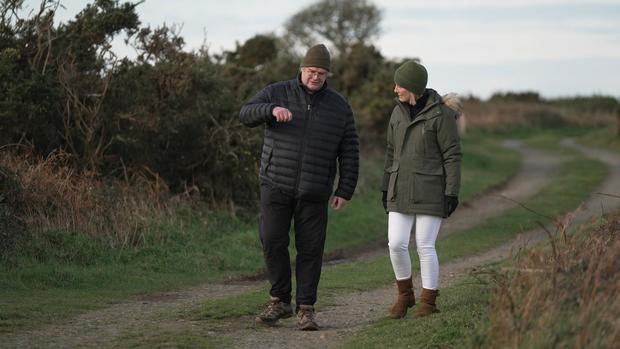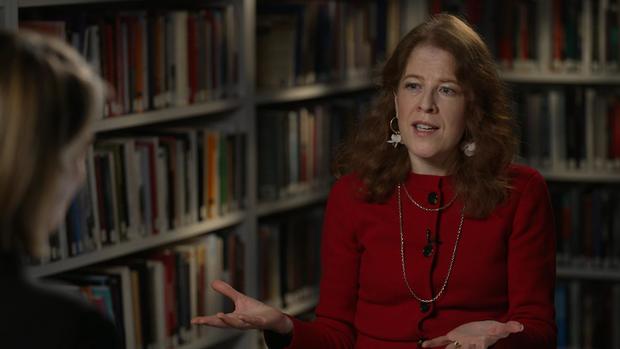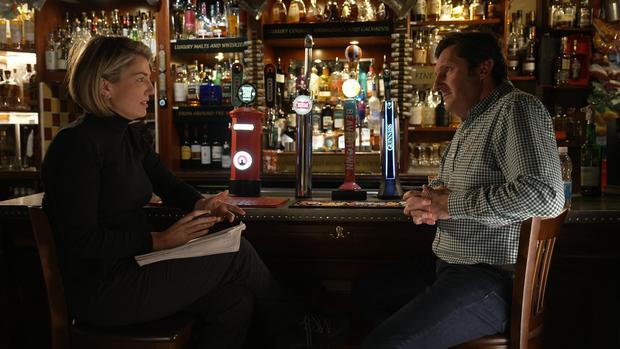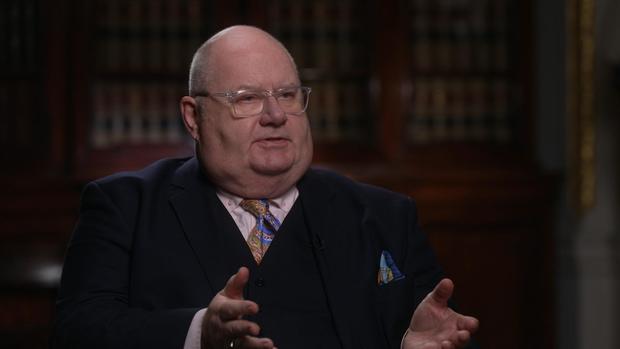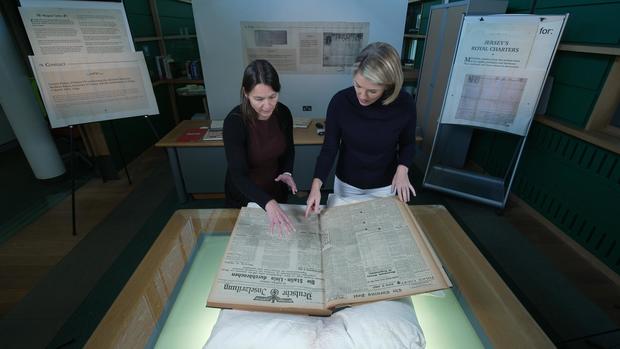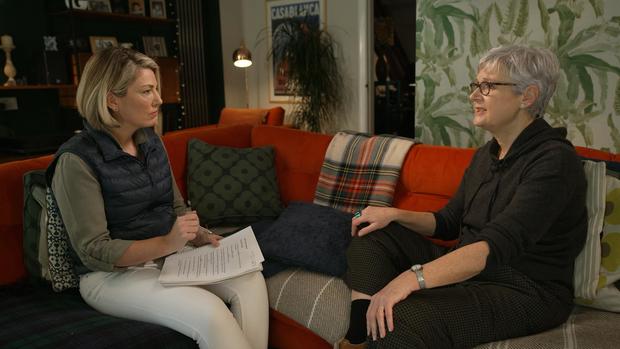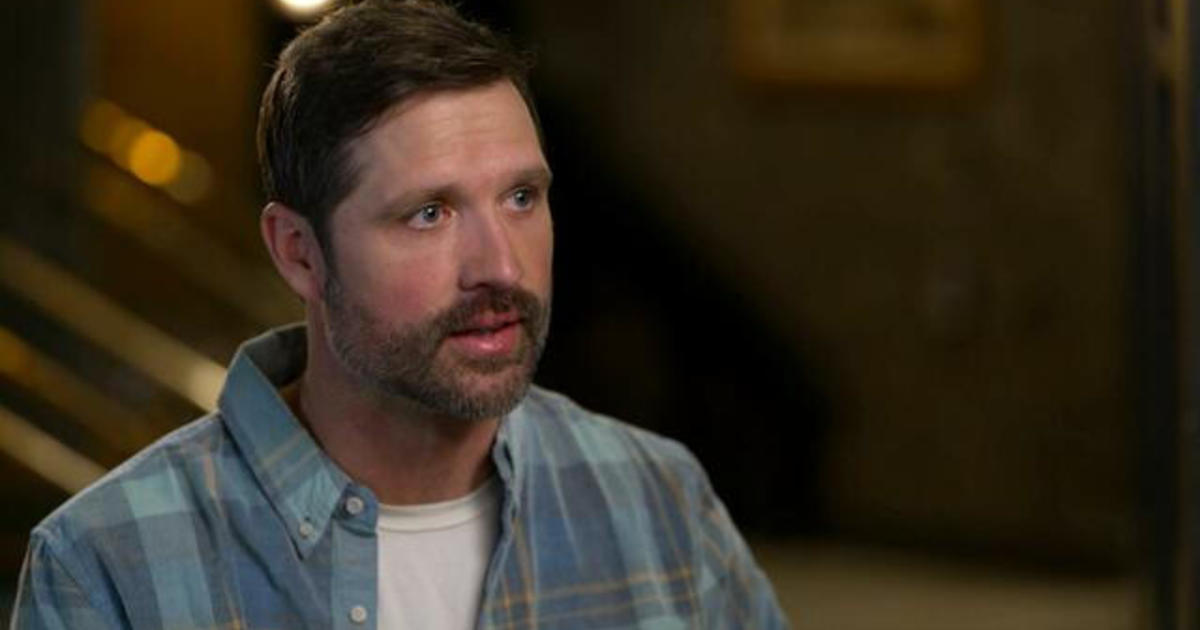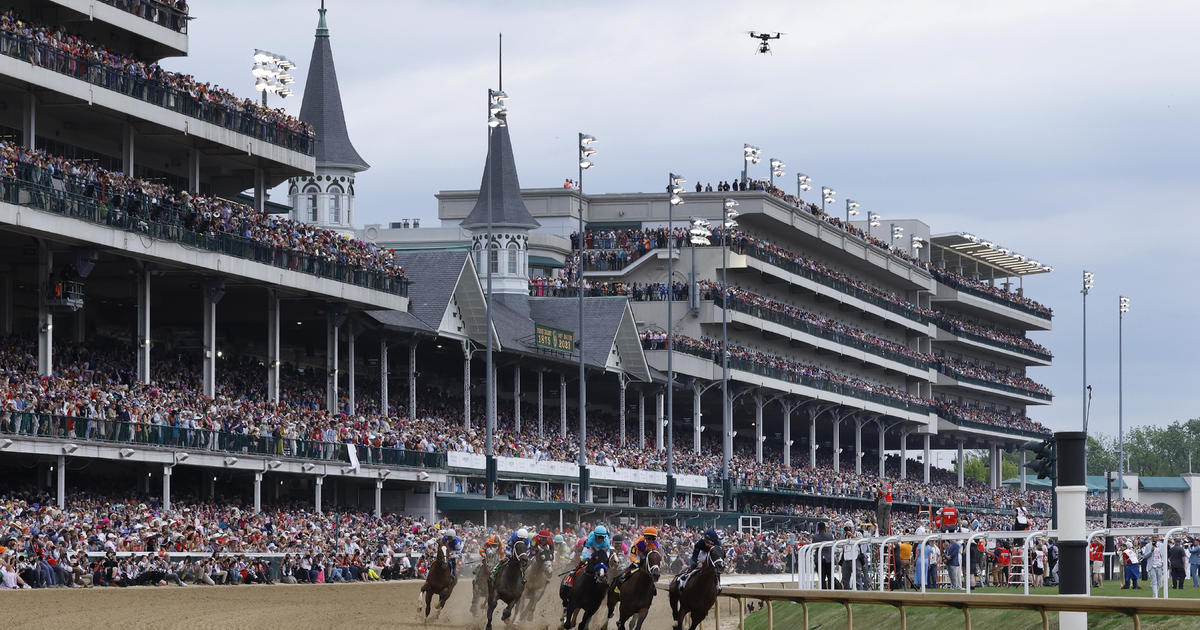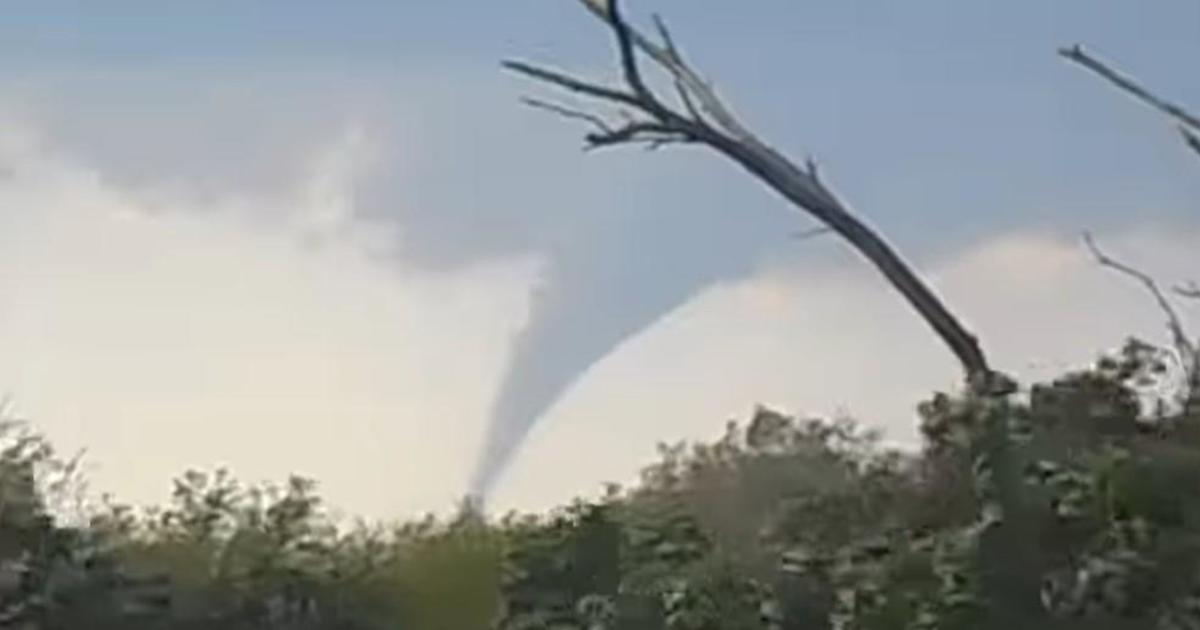Victims of Nazi concentration camps built in British Channel Islands finally being counted
The names Auschwitz, Bergen-Belsen and Buchenwald are infamous as the scene of atrocities -- concentration camps, run by Adolf Hitler's notorious SS.
But what you may be surprised to learn, as we were, is that two Nazi concentration camps were established on British soil in the Channel Islands, around 80 miles from the British mainland. The islands lie just off the coast of France, became possessions of the English crown around a thousand years ago – and were occupied by Germany for nearly five years during World War II. Even in the United Kingdom many people don't know about the camps -- and as we discovered, exactly what happened there is hotly disputed.
Holly Williams: It's pretty well hidden, isn't it?
Marcus Roberts: Yeah, well, if you--
Holly Williams: It's all overgrown.
Marcus Roberts: If you didn't know how to get here, you wouldn't easily stumble across it.
Marcus Roberts: This was a sort of back entrance…
There's not much left of the Third Reich's Lager Sylt concentration camp… on the windswept island of Alderney -- about three miles long and one and a half wide – nature is gradually swallowing up its crumbling concrete walls.
Holly Williams: And the camp's up here…--
Marcus Roberts: These take you straight into the-- the camp.
Holly Williams: Wow.
Marcus Roberts is an Oxford-educated amateur historian who runs heritage tours. He's spent years researching this forgotten chapter in British history.
Marcus Roberts: So undoubtedly if you wanted to put-- a pin on the map, you could say, "This is where the Holocaust happened on British sovereign territory."
When Germany invaded France in 1940, the British government calculated that the Channel Islands had no strategic value – and gave them up without a fight. Nearly all of the residents of Alderney decided to evacuate before the German troops arrived. On the empty island, the Germans set up two concentration camps – as well as labor camps. They brought in prisoners of war and forced laborers to build giant fortifications that still survive today -- part of Hitler's Atlantic wall to protect against Allied attack. A minority of them were Jewish – others were from Russia, Ukraine, Poland, and Spain.
Holly Williams: I understand this was called the Tunnel of Death?
Marcus Roberts: Yes. It was notorious in the memory of prisoners. On two occasions, they were forced to cram in here in an apparent rehearsal for their own death.
After the war, in 1945, the British military investigated the camps, and put the death toll on Alderney in the low hundreds. Some of those who lost their lives were buried under this plot of land. But Marcus Roberts and others argue that more than 10,000 must have died on the island – based on controversial calculations about the size of the labor force needed to build the fortifications. Roberts told us it's because he's Jewish that he's determined to count all of the dead.
Marcus Roberts: There is the-- the Jewish instinct to, you know, leave no one behind
Holly Williams: You're trying to make sure that all the Jewish dead are counted?
Marcus Roberts: Remembered. If you don't remember a life, it's as if they've never lived at all.
Most academics dispute Roberts' estimate of the death toll, but partly as a result of those disagreements, last year the British government appointed a team of researchers to comb through archives across Europe, and more accurately count the number of prisoners who died on Alderney. Dr. Gilly Carr -- an archaeologist at Cambridge University -- is coordinating the review.
Holly Williams: Why is this just a document search, not a dig?
Gilly Carr: It is likely that some of the people in mass graves were Jewish. And according to Halakha or Jewish law, you cannot disturb the dead. But the second reason is that according to prisoner statements, some people were dumped at sea or thrown off cliffs. What are we going to do? Dig up the entire island? Well, we can't do that.
The researchers are drawing on rich material. The Nazis were meticulous record keepers -- and British archives contain first hand testimonies from survivors.
Holly Williams: Look at this. "We were beaten with everything they could lay their hands on: with sticks, spades, pickaxes."
Gilly Carr: It sounds absolutely ghastly.
Holly Williams: "On certain days, five to six, up to 10 men died."
Dr. Carr told us there's no evidence that gas chambers were used on Alderney -- but there were summary executions, and the prisoners built the Nazi fortifications on starvation rations.
Holly Williams: Were they taken to Alderney to be worked to death?
Gilly Carr: They were certainly seen as expendable. The aim was to get every ounce of work out of them. And if they died, it didn't matter, and that was kind of perhaps "expected."
Holly Williams: They were disposable human beings.
Gilly Carr: Yes. Yes.
Holly Williams: How did your father end up in Alderney?
At a pub in the Channel Islands, we met Gary Font. His father – Francisco Font – fought on the losing side in the Spanish Civil War, was arrested in France, handed over to the Germans, and sent to a concentration camp on Alderney. Francisco survived, and later married a British woman -- Gary's mother.
Gary Font: He witnessed-- the execution of a young Soviet boy who decided to leave the working detail and to change his footwear. So he started to pick up these paper bags, and wrap them 'round his feet, and then tie them with string. And a SS guard had seen him do this, and walked up to him and-- and shot him-- point-blank range.
Gary told us his father's experiences left him scarred.
Gary Font: I saw the emotion on his face. Yeah, it's a tough one.
Holly Williams: Do you think that emotion came from-- that he had survived the War in Spain, and survived the camp here?
Gary Font: Yeah, exactly. That was the first time I realized, "Wow, you know, this man has a deep-rooted emotion inside of him that he could never get out."
The British government's effort to get the truth out – by recounting the dead – was commissioned by Lord Pickles – a former cabinet minister and now the U.K.'s envoy for post-Holocaust issues.
Lord Pickles: The figures vary, not by a few hundred, not by a few thousand, by-- by tens of thousands.
Holly Williams: So it was the controversy that prompted you to commission the review?
Lord Pickles: Yes. It seemed to me that the sensible thing was, "Well, okay. Let's do that-- this in the open. Let's do it fully transparent.
He's also asked the researchers to put names to as many of those killed as they can.
Lord Pickles: If you remember them as individuals, then it's another blow against Hitler. Hitler wanted to eradicate the memory of people.
Holly Williams: So this is kind of an ongoing fight against Hitler and his ideas?
Lord Pickles: Hitler's evil hand still continues to affect-- to affect Europe and to affect the world.
But it's taken nearly 80 years for the British government to re-examine what happened on Alderney -- and to make its report public. The official British investigations in 1945 were classified for decades. And unlike the trials of Nazi officials in Nuremberg -- the British authorities failed to prosecute a single German officer who worked on Alderney – even though many of them ended up in British prisoner of war camps.
Holly Williams: I mean just to be clear, these are possible war criminals. The British government has gathered evidence against-- against them. And they are in British custody.
Gilly Carr: Yes, they are at this point, yes.
Holly Williams: A sort of slam-dunk case?
Gilly Carr: You'd have thought.
That's led Marcus Roberts and others to claim that the British government tried to cover-up the extent of the atrocities on Alderney. Dr. Carr told us that could be true -- but one key document from the British War Office investigation that may explain why there were no prosecutions is missing.
Gilly Carr: It could have been shredded-- decades ago as part of, "What do we need these files for anymore?
Holly Williams: But could it also have been shredded for more nefarious purposes?
Gilly Carr: I have no idea. In order for me to say there was a cover-up, I want to see the decisions taken. I want to look through those steps and to make up my own mind.
Holly Williams: Why might the British government have tried to cover up or whitewash what happened on Alderney and-- and maybe more broadly, on the Channel Islands?
Gilly Carr: There are some things that-- that happened that might not-- that the British government might not necessarily have wanted a wider audience to know about.
Those things – once feared too troubling for the broader public – happened on three of the other Channel Islands -- where most residents did not evacuate before the occupation. When the Germans arrived, the locals mostly cooperated – often with little choice. Hitler's portrait was hung outside this cinema on the island of Guernsey. Nazi propaganda showed the British police working for German troops. And British newspapers on the islands printed orders from Berlin.
Holly Williams: This is a British newspaper. And it's got the swastika on top.
Linda Romeril: That's right.
At the official archives on the island of Jersey, Linda Romeril showed us how British officials implemented Nazi policies -- asking Jewish residents to identify themselves, and then confiscating their assets.
Linda Romeril: There was a huge amount of requisitioning of people's houses, people's property during the occupation period.
But some resisted -- risking punishment to paint anti-nazi graffiti, and illegally listening to British news on the radio.
Jenny Lecoat: That's my great aunt Louisa. I suspect that she was probably quite steely.
One member of the resistance was Louisa Gould -- who hid an escaped Russian prisoner in her home for nearly two years. Jenny Lecoat told us when her great aunt Louisa was finally caught, she was sent to Ravensbruck concentration camp in Germany.
Holly Williams: She was killed in a Nazi gas chamber?
Jenny Lecoat: She was gassed to death, yeah.
Holly Williams: After the occupation, did the British government get in touch with your family to talk about what Louisa had done during the occupation, and about her murder by the Nazis?
Jenny Lecoat: The British government, I think, were kind of ashamed. They were horrified it had happened, and they didn't really want to get too involved in what had gone on there.
Holly Williams: Not wanting to talk about the resistance? Or not wanting to talk about the occupation at all?
Jenny Lecoat: Well, it was such a mixed picture. There were people who had resisted the Germans as much as resistance was possible within a tiny, nine-by-five-mile island. And there were also people who'd collaborated. Some people had betrayed their own country. The only possible legislation was treason, which was still a hanging offense. They didn't wanna get into that. That was the confusing, messy, dirty mixed picture of-- of the Channel Islands occupation.
We'll learn more about that messy, dirty history when the British government's review of the death toll at the camps on Alderney is published next month. But it's unlikely to satisfy everyone.
Marcus Roberts: Some kind of-- ap-- apology and, you know, moral recompense would be helpful.
Holly Williams: You-- you want the British government to apologize--
Marcus Roberts: Yeah. I'd like--
Holly Williams: --for not having prosecuted alleged war criminals?
Marcus Roberts: Yeah. So I think it would be appropriate for them to recognize what should have been done, didn't happen.
The horrors carried out on this tiny, remote island are difficult to imagine... the victims were silenced and buried… but now, nearly eight decades later, they're finally being counted.
Produced by Justine Redman and Erin Lyall. Associate producer, Matthew Riley. Broadcast associate, Eliza Costas. Edited by Peter M. Berman.
